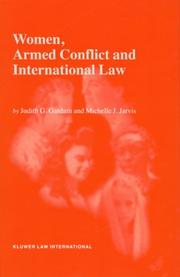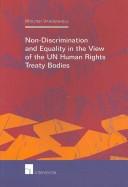| Listing 1 - 10 of 20 | << page >> |
Sort by
|

ISBN: 0754623033 Year: 2002 Publisher: Aldershot Ashgate
Abstract | Keywords | Export | Availability | Bookmark
 Loading...
Loading...Choose an application
- Reference Manager
- EndNote
- RefWorks (Direct export to RefWorks)
Women --- -Equality before the law --- Equal rights --- Civil rights --- Justice --- Equal rights amendments --- Human females --- Wimmin --- Woman --- Womon --- Womyn --- Females --- Human beings --- Femininity --- Legal status, laws, etc --- Law --- Wages --- Social security law --- Sociology of work --- Political systems --- Taxes --- Social policy --- Sociology of the family. Sociology of sexuality --- Australia --- Equality before the law --- Women Legal status, laws, etc. --- Legal status, laws, etc. --- Equal opportunities --- Gender --- Family --- Pay gap --- Labour --- Social security --- Legislation --- Book --- Democracy
Book
ISBN: 9780231177146 9780231543446 0231543441 0231177143 Year: 2017 Publisher: New York : Columbia University Press,
Abstract | Keywords | Export | Availability | Bookmark
 Loading...
Loading...Choose an application
- Reference Manager
- EndNote
- RefWorks (Direct export to RefWorks)
In 1991, Anita Hill's testimony during Clarence Thomas's Senate confirmation hearing brought the problem of sexual harassment to a public audience. Although widely believed by women, Hill was defamed by conservatives and Thomas was confirmed to the Supreme Court. The tainting of Hill and her testimony is part of a larger social history in which women find themselves caught up in a system that refuses to believe what they say. Hill's experience shows how a tainted witness is not who someone is, but what someone can become. Why are women so often considered unreliable witnesses to their own experiences? How are women discredited in legal courts and in courts of public opinion? Why is women's testimony so often mired in controversies fueled by histories of slavery and colonialism? How do new feminist witnesses enter testimonial networks and disrupt doubt? Tainted Witness examines how gender, race, and doubt stick to women witnesses as their testimony circulates in search of an adequate witness. Judgment falls unequally upon women who bear witness, as well-known conflicts about testimonial authority in the late twentieth and early twenty-first centuries reveal. Women's testimonial accounts demonstrate both the symbolic potency of women's bodies and speech in the public sphere and the relative lack of institutional security and control to which they can lay claim. Each testimonial act follows in the wake of a long and invidious association of race and gender with lying that can be found to this day within legal courts and everyday practices of judgment, defining these locations as willfully unknowing and hostile to complex accounts of harm. Bringing together feminist, literary, and legal frameworks, Leigh Gilmore provides provocative readings of what happens when women's testimony is discredited. She demonstrates how testimony crosses jurisdictions, publics, and the unsteady line between truth and fiction in search of justice.
Guatemala --- United States --- Sex discrimination against women --- Sex discrimination --- Sex discrimination in criminal justice administration. --- Witnesses --- Crime --- Testimony --- Evidence (Law) --- Eyewitness identification --- Criminal justice, Administration of --- Equal rights amendments --- Law and legislation. --- Public opinion. --- Sex differences. --- United States of America --- Racism --- Sexually transgressive behavior --- Legislation --- Book --- Intersectionality
Book
ISBN: 9028909354 9789028909359 Year: 1984 Publisher: Antwerpen: De Nederlandsche boekhandel,
Abstract | Keywords | Export | Availability | Bookmark
 Loading...
Loading...Choose an application
- Reference Manager
- EndNote
- RefWorks (Direct export to RefWorks)
Family law. Inheritance law --- Sociology of law --- Belgium --- Droit de la famille --- Familierecht --- Femmes --- Vrouwen --- Marriage law --- Husband and wife --- Equality before the law --- 347.15-055.2 <493> --- 347.62 <493> --- 396 <493> --- Z316.346.2 --- Z347 --- Z==94/03 --- 316:34 --- 316.356.2 --- 347.6 <493> --- 396 --- 396 Feminisme. Vrouwenbeweging. Vrouw en maatschappij --- Feminisme. Vrouwenbeweging. Vrouw en maatschappij --- 316:34 Rechtssociologie --- Rechtssociologie --- 316.356.2 Gezinssociologie --- Gezinssociologie --- 347.6 <493> Familierecht. Gezinsrecht. Huwelijksgoederenrecht--België --- Familierecht. Gezinsrecht. Huwelijksgoederenrecht--België --- Law, Marriage --- Marriage --- Domestic relations --- Sex and law --- Equal rights --- Civil rights --- Justice --- Equal rights amendments --- Law and legislation --- Prohibited degrees --- Flanders (Belgium) --- Family --- Vrouwen--België--Sociale toestand --- Droit matrimonial--Belgique --- Femmes--Belgique--Conditions sociales --- Huwelijksrecht--België --- C5 --- Maatschappelijke organisaties en maatschappelijk leven --- Sociology of the family. Sociology of sexuality --- Law --- Husband and wife - Belgium --- Marriage law - Belgium --- Equality before the law - Belgium --- Relationship man and women --- Legislation --- Book

ISBN: 9781841137483 1841137480 Year: 2007 Publisher: Oxford : Hart,
Abstract | Keywords | Export | Availability | Bookmark
 Loading...
Loading...Choose an application
- Reference Manager
- EndNote
- RefWorks (Direct export to RefWorks)
Human rights --- Social law. Labour law --- Discrimination --- Equality before the law --- Labor laws and legislation --- Egalité devant la loi --- Travail --- Law and legislation --- Droit --- Harcèlement --- Victimes --- Égalité devant la loi --- Droit du travail --- Lutte contre --- 342.7 --- -Discrimination --- -344.01133 --- Oa5.i --- Bias --- Interpersonal relations --- Minorities --- Toleration --- Employees --- Employment law --- Industrial relations --- Labor law --- Labor standards (Labor law) --- Work --- Working class --- Industrial laws and legislation --- Social legislation --- Grondwettelijke rechten en vrijheden. Fundamentele rechten --- -Legal status, laws, etc. --- Legal status, laws, etc. --- 342.7 Grondwettelijke rechten en vrijheden. Fundamentele rechten --- Egalité devant la loi --- European Union --- Europe --- 344.01133 --- Equal rights --- Civil rights --- Justice --- Equal rights amendments --- Discrimination - Law and legislation - European Union countries --- Labor laws and legislation - European Union countries --- Race --- Nationality --- Disability --- Gender --- International --- Age --- Anti-discrimination laws --- Reference work --- Religion --- Romantic and sexual orientation --- Legislation --- Book --- Civil status --- Harcèlement --- Égalité devant la loi
Book
ISBN: 9027127980 Year: 1987 Volume: vol 10 Publisher: Zwolle Tjeenk Willink
Abstract | Keywords | Export | Availability | Bookmark
 Loading...
Loading...Choose an application
- Reference Manager
- EndNote
- RefWorks (Direct export to RefWorks)
International law --- Femmes (Droit international) --- Vrouwen (Internationaal recht) --- Women (International law) --- Women --- -Sex discrimination against women --- -Discrimination against women --- Subordination of women --- Women, Discrimination against --- Feminism --- Sex discrimination --- Women's rights --- Male domination (Social structure) --- Human females --- Wimmin --- Woman --- Womon --- Womyn --- Females --- Human beings --- Femininity --- Legal status, laws, etc --- Law and legislation --- -Legal status, laws, etc --- Sex discrimination against women --- Equal rights amendments --- Women Legal status, laws, etc. --- Legal status, laws, etc. --- International conventions --- Politics --- Independence --- Legislation --- Book --- Economy

ISBN: 1423729706 9781423729709 9041116400 9789041116406 9789004482005 9004482008 Year: 2001 Publisher: Leiden; Boston : Brill | Nijhoff,
Abstract | Keywords | Export | Availability | Bookmark
 Loading...
Loading...Choose an application
- Reference Manager
- EndNote
- RefWorks (Direct export to RefWorks)
The role that gender plays in determining the experience of those caught up in armed conflict has long been overlooked. Moreover, the extent to which gender influences the international legal regime designed to address the humanitarian problems arising from armed conflict has similarly been ignored. In the early 1990s, prompted by extensive media coverage of the rape of women during the conflict in Bosnia Herzegovina, the international community was forced to critically examine the capacity of international law to respond to such crimes. The prevalence of sexual violence, is, however, merely one aspect of the distinctive impact of conflict on women. Although a range of factors influence the way individual women experience armed conflict, the endemic gender discrimination that exists in all societies is a common theme: from Cambodia, where women land-mine victims are less likely to receive treatment for their injuries than are men; to South Africa, where women widowed during the Apartheid years have become outcasts in their own society. To date, the extent to which international law addresses the myriad of ways in which women are affected by armed conflict has received little attention. This work takes the experience of women of armed conflict, matches it with existing provisions of international law, and investigates reasons for the silence of the latter in relation to these events for women. It is the first broad-based critique of international humanitarian law from a gender perspective. The contribution of the United Nations, through its focus on human rights, to improving the protection of women in armed conflict is also considered. The authors underscore the need for new approaches to the issue of women and armed conflict, and canvass a range of options for moving forward.
Humanitarian law. --- Sex discrimination against women --- Women and war. --- Humanitarian law --- Women and war --- Treaties, International --- International Law --- Law, Politics & Government --- War and women --- War --- Women and the military --- Discrimination against women --- Subordination of women --- Women, Discrimination against --- Feminism --- Sex discrimination --- Women's rights --- Male domination (Social structure) --- Humanitarian conventions --- International humanitarian law --- War (International law) --- Equal rights amendments --- Law and legislation. --- Law and legislation --- Sociology of minorities --- Sociology of the family. Sociology of sexuality --- International law --- Human rights --- Criminology. Victimology --- Polemology --- Gender --- Sexually transgressive behavior --- Rape --- Refugees --- Book
Book

ISBN: 9054620668 9789054620662 Year: 1994 Volume: 14 Publisher: Gent Mys & Breesch
Abstract | Keywords | Export | Availability | Bookmark
 Loading...
Loading...Choose an application
- Reference Manager
- EndNote
- RefWorks (Direct export to RefWorks)
Human rights
---
Human Rights
---
Academic collection
---
#SBIB:014.GIFT
---
#SBIB:17H13
---
#SBIB:340H88
---
342.72/.73 <493>
---
#A9406A
---
Basic rights
---
Civil rights (International law)
---
Rights, Human
---
Rights of man
---
Human security
---
Transitional justice
---
Truth commissions
---
342.72/.73 <493> Mensenrechten. Amnesty International. Euthanasie--

ISBN: 9050955002 9789050955003 Year: 2005 Publisher: Antwerpen: Intersentia,
Abstract | Keywords | Export | Availability | Bookmark
 Loading...
Loading...Choose an application
- Reference Manager
- EndNote
- RefWorks (Direct export to RefWorks)
Human rights --- United Nations --- Human rights. --- Actions and defenses. --- Droits de l'homme (Droit international) --- Actions et défenses --- Rules and practice. --- Equality before the law. --- Discrimination. --- #RBIB:gift.2005 --- 342.7 --- Grondwettelijke rechten en vrijheden. Fundamentele rechten --- 342.7 Grondwettelijke rechten en vrijheden. Fundamentele rechten --- Actions et défenses --- Committee on the Elimination of Discrimination against Women --- Discrimination --- Equality before the law --- Basic rights --- Civil rights (International law) --- Rights, Human --- Rights of man --- Human security --- Transitional justice --- Truth commissions --- Equal rights --- Civil rights --- Justice --- Equal rights amendments --- Bias --- Interpersonal relations --- Minorities --- Toleration --- Law and legislation --- United Nations. --- UN --- UNO --- Naciones Unidas --- Nations Unies --- ONU --- Organisation des Nations Unies --- Organizat︠s︡ii︠a︡ Obʺedinennykh Nat︠s︡iĭ --- OON --- Vereinigte Nationen --- Umot ha-meʼuḥadot --- Organizacja Narodów Zjednoczonych --- ONZ --- Forente nasjoner --- Forenede nationer --- FN --- Förenta nationerna --- Gaertʻianebuli erebi --- Organização das Nações Unidas --- PBB --- Perserikatan Bangsa-Bangsa --- Kokusai Rengō --- Kokuren --- ENSZ --- Egyesült Nemzetek Szövetsége --- Birleșmiș Milletler Teșkilâtı --- Birlăşmiş Millătăr Tăşkilatı --- Birlashgan Millatlar Tashkiloti --- BMT --- YK --- Yhdistyneet kansakunnat --- OUN --- Organizacija Ujedinjenih Nacija --- NU --- Nazioni Unite --- OSN --- Organizace spojených národů --- Sāzmān-i Milal-i Muttafiq --- Bangsa² Bersatu --- Organización de las Naciones Unidas --- Ühinenud Rahvaste Organisatsioon --- ÜRO --- Organismos tōn Hēnōmenōn Ethnōn --- Umoja wa Mataifa --- Vereinten Nationen --- Vereinte Nationen --- Hayʼat al-Umam al-Muttaḥidah --- Verenigde Naties --- VN --- Organizația Națiunilor Unite --- Um --- Lien ho kuo --- OKB --- Organizata e Kombeve të Bashkuara --- Lian he guo --- U.N. --- Umam al-Muttaḥidah --- OĒE --- Hēnōmena Ethnē --- Organizácia Spojených Národov --- Sahaprachāchāt --- Națiunile Unite --- Organizat︠s︡ii︠a︡ na obedinenite nat︠s︡ii --- Organismos Hēnōmenōn Ethnōn --- Manẓūmat al-Umam al-Muttaḥidah --- AAN --- Arhanizatsyi︠a︡ Ab'i︠a︡dnanykh Natsyĭ --- Nações Unidas --- Orhanizat︠s︡ii︠a︡ Ob'i︠e︡dnanykh Nat︠s︡iĭ --- O.Ē.E. --- ʻOngkān Sahaprachāchāt --- Sjuninejal Konob'laq --- Sāzmān-i Milal-i Muttaḥid --- Milal-i Muttaḥid --- Nėgdsėn U̇ndėstniĭ Baĭguullaga --- NUB --- Rāshṭrasaṃgha --- או״מ --- أمم المتحدة --- الأمم المتحدة --- سازمان ملل متحد --- 国際連合 --- 联合囯 --- 聯合國 --- United Nations Organization --- Liên Hiệp Quó̂c --- Liên Hợp Quó̂c --- LHQ --- Kula Samagga --- YūʼAṅʻnʻ --- 联合国 --- Организация на обединените нации --- Организация Объединённых Наций --- Human Rights. --- DROITS DE L'HOMME --- LUTTE CONTRE LA DISCRIMINATION --- EGALITE --- O.N.U. --- DROIT INTERNATIONAL PUBLIC --- DROIT A LA NON-DISCRIMINATION --- DROIT DES GENS --- SOURCES --- TRAITES --- Equal opportunities --- International --- International conventions --- Anti-discrimination laws --- Legislation --- Book

ISBN: 0198763239 Year: 1997 Volume: *2 Publisher: Oxford Clarendon Press
Abstract | Keywords | Export | Availability | Bookmark
 Loading...
Loading...Choose an application
- Reference Manager
- EndNote
- RefWorks (Direct export to RefWorks)
Discriminatie op grond van het geslacht in de tewerkstelling --- Discrimination against women --- Discrimination sexuelle dans l'emploi --- Discrimination sexuelle à l'égard des femmes --- Emploi [Discrimination sexuelle dans l' ] --- Emploi féminin -- Discriminations --- Femmes -- Emploi -- Discrimination --- Homemakers --- Housewives --- Huisvrouwen --- Inégalité professionnelle entre les femmes et les hommes --- Mixité professionnelle --- Ménagères --- Recrutement -- Discrimination sexuelle --- Sex discrimination against women --- Sex discrimination in employment --- Sexual discrimination against women --- Subordination of women --- Tewerkstelling -- Discriminatie op grond van het geslacht --- Vrouwelijke tewerkstelling -- Discriminaties --- Vrouwen -- Tewerkstelling -- Discriminatie --- Vrouwen--Discriminatie op grond van het geslacht --- Women [Discrimination against ] --- Égalité professionnelle entre les femmes et les hommes --- Personnel management --- Sociology of minorities --- Sociology of the family. Sociology of sexuality --- Social law. Labour law --- History --- Wages --- Sociology of work --- Public law. Constitutional law --- Law of real property --- Social policy --- Law --- Gynaecology. Obstetrics --- Social security law --- European Union --- Great Britain --- Equal rights amendments --- Women, Discrimination against --- Feminism --- Sex discrimination --- Women's rights --- Male domination (Social structure) --- Women --- Mothers --- Wives --- Employment (Economic theory) --- Sex role in the work environment --- Sexual division of labor --- Law and legislation --- Employment --- Equal opportunities --- Marriage --- Income --- Pay gap --- Labour law --- Pensions --- Affirmative action --- Social security --- Women's suffrage --- Legislation --- Pregnancy --- Paid labour --- Book --- Discrimination --- Property rights
Multi
ISBN: 1780323824 1780323832 9781780323831 9781299717701 1299717705 9781780323824 9781780323817 1780323816 9781780323848 1780323840 1350222569 Year: 2013 Publisher: London, England : [London, England] : Zed Books, Bloomsbury Publishing,
Abstract | Keywords | Export | Availability | Bookmark
 Loading...
Loading...Choose an application
- Reference Manager
- EndNote
- RefWorks (Direct export to RefWorks)
The persecution of people in Africa for their assumed homosexual orientation has received considerable media coverage in recent years. However, much of the analysis has criticized African leadership and culture without considering local nuances, historical factors and external influences. Based on pioneering historical research and engagement with lgbti and HIV/AIDS activism, this book provides a sympathetic overview of the issues and a hope outlook on the potential of sexual rights for all. "The persecution of people in Africa on the basis of their assumed or perceived homosexual orientation has received considerable coverage in the popular media in recent years. Gay-bashing by political and religious figures in Zimbabwe and Gambia; draconian new laws against lesbians and gays and their supporters in Malawi, Nigeria and Uganda; and the imprisonment and extortion of gay men in Senegal and Cameroon have all rightly sparked international condemnation. However, much of the analysis thus far has been highly critical of African leadership and culture without considering local nuances, historical factors and external influences that are contributing to the problem. Such commentary also overlooks grounds for optimism in the struggle for sexual rights and justice in Africa, not just for sexual minorities but for the majority population as well. Based on pioneering research on the history of homosexualities and engagement with current lgbti and HIV/AIDS activism, Marc Epprecht provides a sympathetic overview of the issues at play and a hopeful outlook on the potential of sexual rights for all."--Page 4 of cover.
Social justice --- Homophobia --- Anti-gay bias --- Anti-GLBT bias --- Anti-homosexual bias --- Anti-LGBT bias --- Antigay bias --- Discrimination against gays --- Fear of gays --- Fear of homosexuality --- GLBT bias --- Homonegativity --- Homophobic attitudes --- Homoprejudice --- Lesbophobia --- LGBT bias --- Sexual orientation discrimination --- Gay liberation movement --- Gay liberation movement. --- Gay rights --- Gay rights. --- Homophobia. --- Homosexuality --- Homosexuality. --- Human Rights. --- SOCIAL SCIENCE --- Sexual rights --- Sexual rights. --- Social Justice. --- Social justice. --- Gay Studies. --- Africa. --- Sociology of the family. Sociology of sexuality --- Africa --- Sub-Saharan Africa --- Discrimination --- Phobias --- Heterosexism --- Equality --- Justice --- Sociology: sexual relations --- Collective Human Rights --- Equal Rights --- Linguistic Rights --- Right to Housing and Shelter --- Rights of Indigenous Peoples --- Human Rights, Collective --- Indigenous Peoples Rights --- Rights, Collective Human --- Rights, Equal --- Rights, Linguistic --- Social Justice --- Human Rights Abuses --- Gay and lesbian rights --- Gay men --- Gays --- Lesbian rights --- Lesbians --- Rights of gays --- Rights of lesbians --- Civil rights --- Gay and lesbian liberation movement --- Gay and lesbian movement --- Gay and lesbian rights movement --- Gay lib --- Gay movement --- Gay rights movement --- Homophile movement --- Homosexual liberation movement --- Homosexual movement --- Homosexual rights movement --- Lesbian liberation movement --- Lesbian rights movement --- Social movements --- Sexual freedom --- Human rights --- Same-sex attraction --- Sexual orientation --- Bisexuality --- Legal status, laws, etc. --- Law and legislation --- Religious fundamentalism --- Violence --- Transgender --- Islam --- Government policy --- Book --- Christianity --- Action groups --- Anthropology --- Imaging
| Listing 1 - 10 of 20 | << page >> |
Sort by
|

 Search
Search Feedback
Feedback About UniCat
About UniCat  Help
Help News
News